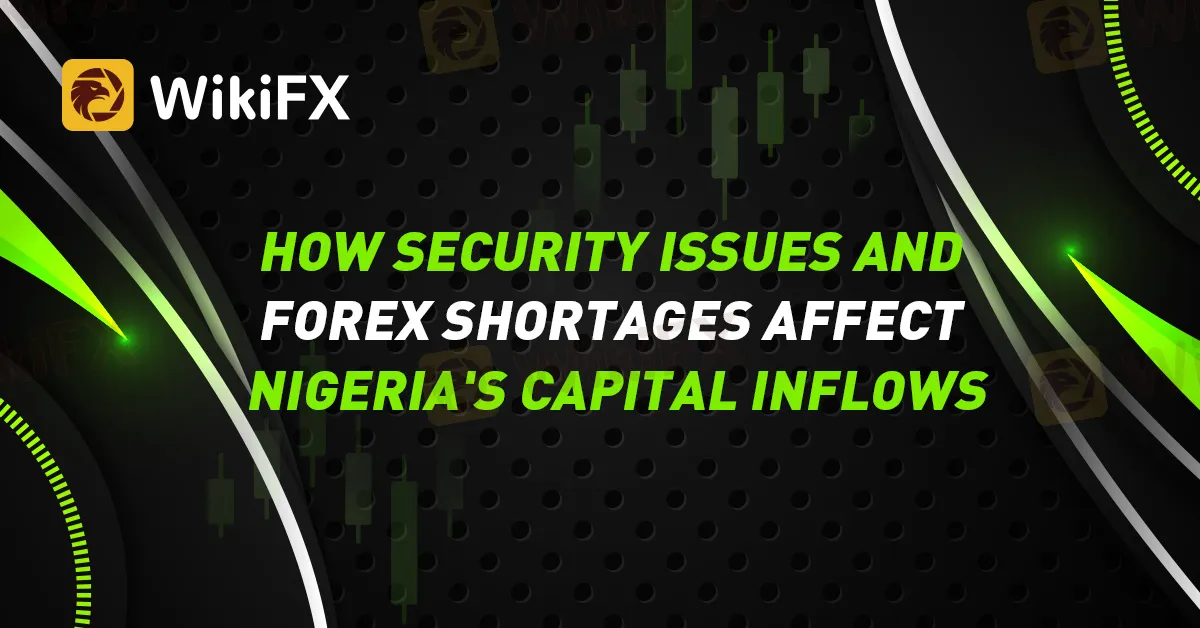简体中文
繁體中文
English
Pусский
日本語
ภาษาไทย
Tiếng Việt
Bahasa Indonesia
Español
हिन्दी
Filippiiniläinen
Français
Deutsch
Português
Türkçe
한국어
العربية
HOW SECURITY ISSUES AND FOREX SHORTAGES AFFECT NIGERIA'S CAPITAL INFLOWS
Abstract:Importing capital involves bringing in funds through direct and portfolio investments with Trade credits and other investments. It is part of the most important strategies to guarantee stability in a country's economy. In addition to being a significant source of foreign cash, it offers the economy with the necessary liquidity and jobs.

Importing capital involves bringing in funds through direct and portfolio investments with Trade credits and other investments.
It is part of the most important strategies to guarantee stability in a country's economy. In addition to being a significant source of foreign cash, it offers the economy with the necessary liquidity and jobs.
Foreign direct investment, foreign portfolio investment, and other investments are the three categories under which capital is imported.
A decrease in capital importation into any nation is only a sign that the nation may be going through hard times or losing the trust of investors.
In international trade, a country's access to foreign exchange is inversely correlated to its level of capital imports. According to analysts, this significantly lowers the pace of inflation.
In a recent report titled “Nigerian Capital Importation Q2 2022,” the National Bureau of Statistics stated that the total value of capital importation into Nigeria in the second quarter of 2022 was $1.535 billion, up from $875.62 million in the same quarter of 2021, representing an increase of 75.34 percent.
Capital importation declined from US$1,573.14m, or 2.40%, compared to the previous quarter. The largest portion of capital importation—49.33 percent, or US$757.32 million—was acquired through portfolio investing.
In comparison, there was a 2.40 percent decline in capital imports, which is unfavorable evidence of the fragile state of the economy.
A number of causes, including the insecurity, and a lack of foreign currency, among others, were cited by experts, including economists and bankers, as the cause of the decline.
Uche Olowu, a past president of the Chattered Institute of Bankers of Nigeria, a loss of confidence in an economy could also result in a decrease in capital importation. Additionally, he cited the conflict, the oil crisis, inflation, and insecurity as important factors undermining investor confidence in the country's economy.
The economy is what causes that. Because of the Russia-Ukraine war, the energy crisis, and inflation, there is generally a low level of investment.
Most importantly, uncertainty does not inspire confidence in investors to enter the economy. Due to the high cost of doing business, we don't have the expected level of investment being brought in by visitors. Therefore, the issue we have is complex and both endogenous and exogenous.
Olowu went on to elaborate, stating that many central banks control inflation by telling people on how and where to invest.
Central banks in many economies are generally attempting to control inflation in the global economy, therefore people are being very careful about where to invest.
This is a contributing factor in the economy's low capital imports. We need to build that confidence, says Olowu. The upcoming election will also be an influence. You already know that investors will be interested in monitoring the election results and the level of stability. People will start to bring in funds and for portfolio investments if their stability.
“So, all these things combined have kind of hampered the flow of funds from the developed world to our own economy,” continued Olowu. Can I then get my money back if I bring it in?
You may have seen the other day that the inability to accept back foreign currency caused problems for the international carriers. You want to bring in money and make sure that once you want to withdraw it, you can get your money back. Having faith in the economy is a difficulty.
Speaking at the same time, Mr. Adewale Oyerinde, Director-General of the Nigerian Employers Consultative Association, stated that the report showed a negative trend in the quarter-by-quarter analysis.

Disclaimer:
The views in this article only represent the author's personal views, and do not constitute investment advice on this platform. This platform does not guarantee the accuracy, completeness and timeliness of the information in the article, and will not be liable for any loss caused by the use of or reliance on the information in the article.
Read more

WikiFX Announcement: Suspension of Weekly Simulated Trading Competition
Since its launch in early 2023, the WikiFX Weekly Simulated Trading Competition has successfully hosted 99 consecutive rounds, attracting enthusiastic participation from traders worldwide and creating countless thrilling trading moments.

What Can Forex Traders Learn from Ne Zha?
The animated blockbuster Ne Zha: Birth of the Demon Child tells the story of Ne Zha’s journey to defy fate and take control of his own destiny. Beyond being an inspiring tale filled with action and character growth, the film conveys profound life lessons - many of which resonate deeply with the world of forex trading.

Retirement Savings Wiped Out: RM500,000 Lost to a Scammer named Richard Ong
A retiree was deceived into parting with more than RM500,000 after falling victim to an elaborate investment scam that promised substantial returns.

The Dark Side of Social Media Investments: How a Manager Lost RM2.08 Million
A Malaysian company manager suffered financial losses amounting to RM2.08 million after becoming the victim of an investment scam promoted through Facebook.
WikiFX Broker
Latest News
Forex Market Outlook: Key Currency Pairs and Trading Strategies for March 24–28, 2025
Singapore Police Crack Down on Scams: $1.9M Seized, 25 Arrested
Gold Prices Swing Near Record Highs
XTB Opens New Dubai Office
Africa Cybercrime Bust: Over 300 Arrested in Fraud Crackdown
The Growing Threat of Fake Emails and Phishing Scams
Hong Kong Banks and Authorities Collaborate to Freeze Fraudulent Accounts Faster
SocialFi and the Forex Market: A New Era for Decentralized Social Trading?
Is Billion Bucks Fx Scam?
BaFin Halts USDe Token Issuance, Citing Serious Compliance Failures
Currency Calculator







